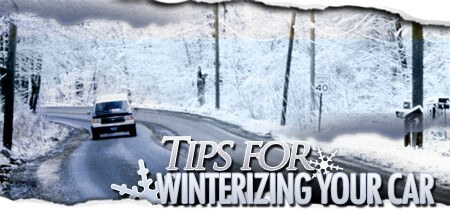Winter months can present many challenges for your vehicle. While modern vehicles are designed to handle inclement weather conditions, there are some basic steps every driver should take as the days get shorter and the temperature drops.
Fluid Refill and Replacement
Whether you take your car in for regular maintenance or you're a do-it-yourself home mechanic, the best way to winterize your car is to start by checking your fluid levels.
- Coolant—It is especially important to have the correct antifreeze/water mixture to prevent fluid from freezing in your radiator. Consult your vehicle's owner's manual for information on this mixture. Pick up a tester at an auto parts store and make sure the fluid is filled to the maximum line.
- Oil—Some mechanics recommend switching to a thinner oil if you live where temperatures drop below freezing. Your best bet is to consult your owner's manual or talk to your mechanic. More about oil change...
- Wiper fluid—Often overlooked, you'll need freeze-resistant wiper fluid to keep your windshield clean and your vision clear.
Tire Inspection or Replacement
Low air pressure and worn tires are especially dangerous on wet or slick roads, as both can reduce traction. Check your owner's manual for the recommended PSI. If you've never checked tire pressure yourself, stop by an auto parts store and pick up a tire gauge. Our step-by-step guide to checking tire pressure can help you check pressure and properly inflate your tires.
If you live in an area with a lot of snowfall, consider snow tires. It's a valuable investment that can increase your traction and improve your safety on the road.
Snow Tires
Mounting the right tires on your car or truck can give you a huge advantage when trekking through snow. Many car makers and tire manufacturers recommend changing all four tires to snow tires in the winter. If you don't swap all four, the difference between snow and summer tires can cause other problems for your vehicle.
If you live off the beaten path, you can even buy snow tires with studs to help you get where you're going all winter long. When spring comes, though, you'll be glad to get out of the heavy winter tires because your fuel efficiency and handling will improve with a less aggressive tire.
Another option is all-season tires that you drive year-round―winter and summer. The advantage of all-season tires is that you don't change the tires before winter or need to keep two sets of rims. Of course, the disadvantage is that you don't get all the great features of a specialized seasonal tire.
Battery Capacity in Cold Weather
It isn't only your engine that doesn't like to start in the winter. Your battery capacity is reduced by the cold weather, too. A thorough inspection of your battery, cables, terminals, and fluid will help you make sure your car is ready for the winter.
Check over the battery cables for cracks and breaks. The terminals should fit snugly with no loose connections. You can check your battery fluid by uncovering the refill hole (or sometimes holes). If the level is below the bottom of the cap, refill with distilled water.
To read the level of charge in your battery, you will need to turn the engine off. Some batteries have a built-in hydrometer eye that tells you the amount of voltage remaining in the battery. If you prefer, a handheld hydrometer can be used to collect the same information.
While you're inspecting your battery, look around for the manufacture date. Knowing how old your battery is can clue you in to when it will begin to lose charge. Shopping for a new battery? Never buy one with a six-month-old manufacture date.
Emergency Kit
Keeping a safety kit in your car all year is a good idea. Things like road flares, a jack, a lug wrench, and a first aid kit should be at hand no matter what. It's a good idea to update this kit with seasonal items that can keep you warm and prepared for Mother Nature's worst.
Items to include in your winter safety kit include:
- Flashlight.
- Blanket, leather gloves, and hat.
- Bag of kitty litter or sand.
- This can help if your tires get stuck in the snow or slush.
- Ice scraper and brush.
- Small shovel.
- Safe and leak-proof container of coolant.
- Snacks.
The Importance Regular Maintenance
Bottom line, your vehicle needs year-round TLC. If you're not the do-it-yourself type, take your vehicle in to a trusted mechanic before temperatures drop.
Make sure they check all of the above, along with belts, hoses, and spark plugs to prevent a dangerous breakdown during a downpour. For more information, check out our handy page on routine vehicle maintenance.
Quality Tune Up Centers can perform all services mentioned in this article! Save much more by using our coupons.
http://www.qtucarcare.com/coupons
